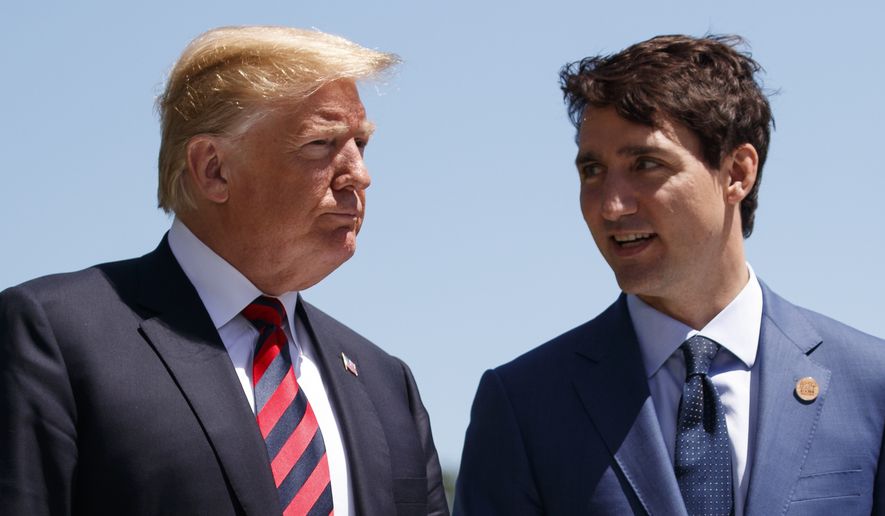In a second day of round-the-clock trade negotiations, U.S. and Canada teams grew confident Wednesday that they will strike a deal before President Trump’s end-of-week deadline for Ottawa to join a new NAFTA.
Mr. Trump said Canada badly wants in on the U.S.-Mexico deal that would replace the 24-year-old North American Free Trade Agreement and was working hard to make it happen.
“They want to be a part of the deal. We gave until Friday, and I think we are probably on track. We’ll see what happens,” Mr. Trump told reporters at the White House.
Canadian Prime Minister Justin Trudeau, who clashed with Mr. Trump over trade issues in the past, also sounded optimistic.
“We recognize that there is a possibility of getting there by Friday, but it is only a possibility, because it will hinge on whether or not there is ultimately a good deal for Canada,” he said at a news conference in northern Ontario. “No NAFTA deal is better than a bad NAFTA deal.”
Canada entered breakneck negotiations following the U.S. and Mexico announcing Monday that they had a tentative agreement to replace the three-way trade agreement.
Mr. Trump set a Friday deadline for Canada to sign on or else the U.S.-Mexico deal would be submitted to Congress as is.
If Canada is out, Mr. Trump threatened to hit Canada with a 25 percent tariff on cars.
“Canada very much wants to make a deal,” said Mr. Trump. “I think it is going to obviously very good for Canada if they do. And I think it’s probably not going to be good at all if they don’t.”
He said the U.S. has a “very good relationship” with Canada.
Mr. Trump made it a top priority to replace NAFTA, which he calls “the worst deal ever made.” The negotiations to rewrite it have dragged on for a year.
Canada stayed on the sidelines this summer, while the U.S. and Mexico did the hard bargaining. But Trump administration officials said the deal addressed top Canadian concerns.
Still, Canada is under pressure to accept the deal or get left out.
Earlier, Canadian Foreign Affairs Minister Chrystia Freeland said she was encouraged by progress made in trade talks.
“We are working extremely hard, extremely intensely and we continue to be optimistic about the progress we can make this week,” said Ms. Freeland, who cut a trip to Europe short and jetted off Tuesday to Washington for the trade talks.
“When it comes to specific issues, we have a huge amount of work to do,” she added, declining to identify sticking points for Canada.
The tentative deal sought to end the mass exodus of manufacturing from the U.S., especially with automakers.
It would raise the minimum level of North American components in an automobile to qualify for tariff-free treatment under NAFTA from 62.5 percent to 75 percent.
The agreement also would boost wages for Mexican workers, keep agricultural products tariff free, increase environmental standards in Mexico and overhaul rules for copywriters and trade dispute resolutions.
The agreement would last 16 years, with an opportunity to review it and adjust its terms after six years.
A major sticking point for Canada is that the deal would eliminate the settlement system for anti-dumping disputes, NAFTA’s Chapter 19.
The U.S. wanted to nix the system and Mexico agreed, but Canada wants the mechanism to fight the Trump administration’s tariffs on softwood lumber, paper and other products.
Meanwhile, Mr. Trump wants Canada to end its tariffs on dairy products, which can run nearly 300 percent.
Ottawa signaled that it is ready to sacrifice it’s dairy tariffs in exchange for a dispute-settlement system, The Globe and Mail reported, but the haggling continued.
• S.A. Miller can be reached at smiller@washingtontimes.com.




Please read our comment policy before commenting.